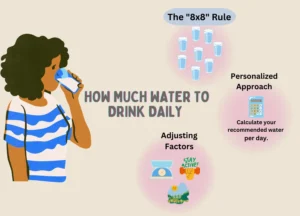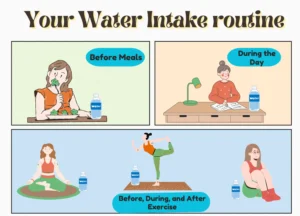How Much Water to Drink Daily for Weight Loss: A Women’s Guide

When it comes to shedding those extra pounds, water might be your secret weapon. Understanding how much water to drink daily for weight loss can significantly impact your journey towards a healthier, fitter you. Beyond keeping you hydrated, water is crucial in boosting metabolism, curbing cravings, and optimizing calorie burning.
Whether you aim to lose weight or maintain a healthy body, knowing the right amount of water to drink daily is key to achieving your goals. This article delves into water’s critical role in weight loss, offering scientific insights and practical tips to support your wellness goals effectively.
How Water Helps in Weight Loss
Water is not just a passive component in your body; it actively participates in various metabolic processes, crucial for weight management. Beyond simply quenching your thirst, water plays a vital role in regulating your metabolism, the process by which your body converts food and drinks into energy.
Strategic water intake plays a crucial role in weight loss by influencing appetite control and calorie intake. Studies have shown that pre-meal water consumption can contribute to weight loss by promoting a feeling of fullness, which reduces the likelihood of overeating during meals. By curbing appetite, water helps control calorie intake and support dietary adherence, which are key factors in achieving sustainable weight loss goals.
Boosting Metabolic Rate
Research has shown that staying adequately hydrated can significantly boost your metabolic rate(the rate at which your body burns calories). This means drinking enough water can help your body burn more calories even at rest.
For instance, a study published in The Journal of Clinical Endocrinology & Metabolism demonstrated that consuming 500 ml (about two cups) of water could increase metabolic rate by up to 30% within 10 minutes of drinking. This immediate impact underscores how water consumption can influence calorie expenditure in a short amount of time.
Heat Production and Calorie Burn
When you drink water, your body needs to expend energy to heat it to body temperature, a process known as thermogenesis. This additional energy expenditure contributes to the overall increase in metabolic rate observed after drinking water.
Moreover, adequate hydration ensures that your body’s metabolic processes function efficiently, optimizing the breakdown and utilization of nutrients from food.
Appetite Regulation and Calorie Intake
Water plays a role in controlling appetite and reducing calorie intake. Thirst may sometimes be confused with hunger, which results in overindulging in calories. By staying hydrated, you can better differentiate between thirst and hunger cues, potentially reducing your overall calorie intake throughout the day.
How Much Water to Drink Daily for Weight Loss

Ensuring you consume enough water each day is crucial not only for overall health but also for supporting your weight loss goals. While the “8×8” rule—eight 8-ounce glasses of water per day is a widely recognized guideline, individual hydration needs can vary significantly based on several factors.
The “8×8” Rule
The “8×8” rule suggests drinking eight 8-ounce glasses of water daily, totaling about 2 liters or half a gallon. This guideline serves as a simple starting point for maintaining adequate hydration levels. However, it may not account for variations in body size, physical activity, or environmental conditions, which can influence water requirements.
Personalized Approach
For a more personalized approach to hydration, experts often recommend consuming about half an ounce to an ounce of water per pound of body weight. Here’s how you can calculate your specific daily water intake:
- Determine your body weight in pounds.
- Multiply your body weight by 0.5 to 1 to find your recommended ounces of water per day.
For example, if you weigh 140 pounds:
Minimum recommended intake: 140 pounds × 0.5 = 70 ounces of water per day/ 8 ounces per glass = 8.75 glasses per day
Maximum recommended intake: 140 pounds × 1 = 140 ounces of water per day/ 8 ounces per glass = 17.5 glasses per
This range of 70 to 140 ounces per day for someone weighing 140 pounds allows for activity, climate, and health differences.
Adjusting Your Intake
Several factors can influence your daily water needs:
- Body Weight: Larger individuals typically require more water to maintain hydration.
- Activity Level: Physical activity increases water loss through sweat and requires additional fluid intake to replenish lost fluids.
- Climate: Hot and humid weather can increase sweat production, necessitating higher water intake to prevent dehydration.
You can better meet your body’s hydration needs, support optimal bodily functions, and enhance your efforts toward weight loss and overall well-being by adopting a personalized approach to water intake. Remember to listen to your body’s cues for thirst and adjust your water intake accordingly throughout the day.
Personalized Approach for Women
Women experience unique hydration needs during different life stages, including pregnancy, breastfeeding, and menstruation. Understanding these specific needs is crucial for maintaining optimal health and overall well-being.
Pregnancy
During pregnancy, a woman’s body undergoes significant changes, including an increase in blood volume and the development of the placenta, which necessitates higher fluid intake. According to guidelines from the Institute of Medicine, pregnant women should aim to consume approximately 10 cups of fluids daily, equivalent to about 2.4 liters.
Adequate hydration during pregnancy helps support fetal development, regulates amniotic fluid levels, and aids in nutrient transport to the baby.
Breastfeeding
Breastfeeding women have increased fluid requirements to support milk production and maintain hydration for themselves and their infants. It’s recommended that breastfeeding women consume about 13 cups of fluids daily, which is approximately 3.1 liters. Proper hydration ensures an adequate milk supply and helps prevent dehydration, which can affect milk composition and volume.
Menstruation and Hormonal Changes
During menstruation, hormonal fluctuations can affect water retention and hydration levels. Many women experience increased thirst during their menstrual cycle, a natural response to hormonal changes. Staying hydrated can help alleviate symptoms like bloating and cramping associated with menstruation.
Adjusting Hydration Needs
In addition to life stages, factors such as body weight, physical activity, and climate influence a woman’s daily fluid needs. Women who are physically active or live in hot, humid climates may need to increase their water intake to compensate for fluid loss through sweat.
By understanding and addressing these unique hydration needs throughout different stages of life, women can ensure they maintain optimal health, support bodily functions, and enhance their overall quality of life. Consulting with healthcare professionals can provide personalized guidance on fluid intake tailored to individual circumstances and health goals.
Timing Your Water Intake

Before Meals:
Drinking water before meals can optimize its benefits for weight loss by enhancing satiety and reducing the amount of food consumed during the meal. This pre-meal hydration strategy helps portion sizes and overall calorie intake throughout the day.
Research published in Obesity demonstrates that adults who drank 500 ml of water before meals experienced greater weight loss over 12 weeks than those who did not increase their water intake. This highlights the importance of hydration in managing food consumption and supporting weight loss efforts effectively.
During the Day:
Spacing out water intake ensures consistent hydration, maintains metabolism, and supports overall well-being. Whether between meals or snacks, staying hydrated throughout the day helps regulate bodily functions and promote energy balance.
Before, During, and After Exercise:
Hydrating before, during, and after exercise is crucial for optimizing performance, enhancing endurance, and aiding recovery. Proper hydration supports physical activity by regulating body temperature, lubricating joints, and delivering nutrients to muscles, all of which contribute to better exercise outcomes and overall fitness goals.
Hydration Tips for Weight Loss Success
Ensuring adequate water intake is vital for supporting weight loss and overall well-being. Here are some practical tips to boost your water consumption:
- Keep a reusable water bottle with you throughout the day to make it convenient to drink water wherever you go. Having water readily available encourages regular hydration and helps you meet your daily fluid intake goals.
- Enhance the taste of water by adding slices of lemon, cucumber, or mint. Infusing water with natural flavors can make it more enjoyable, motivating you to consume more during the day.
- Set reminders on your phone or use hydration-tracking apps to monitor your water consumption. These tools can help you stay accountable and ensure drinking enough water consistently.
Signs of Proper Hydration
Monitoring your hydration status is crucial for maintaining overall health and supporting weight loss efforts. Here are some key indicators to help you assess your hydration level:
Urine Color
One simple way to gauge hydration is by checking the color of your urine. It should be pale yellow, indicating that you are adequately hydrated. Darker yellow urine may signal dehydration, while clear urine could indicate overhydration. Monitoring urine color throughout the day can provide insights into your hydration status.
Thirst Cues and Physical Signs
Listening to your body’s thirst cues is essential. If you feel thirsty, it’s a sign that your body needs fluids. Additionally, paying attention to physical signs like dry mouth, fatigue, or headache can indicate dehydration. You may modify your water intake to stay at the ideal state of hydration by identifying these signals.
Avoiding Excessive Water Intake
While hydration is essential, drinking excessive water can have negative health consequences. Here’s what you need to know about avoiding overhydration:
- Drinking too much water can lead to a condition called hyponatremia, where low sodium levels in the blood disrupt electrolyte balance. Symptoms may include nausea, headache, confusion, and in severe cases, seizures. It’s important to pay attention to your body’s cues and drink water in moderation.
- To avoid overhydration, drink water in moderation based on your needs and activity level. Pay attention to your body’s thirst signals and modify your daily water consumption. Maintaining a balance between hydration and electrolyte levels is essential for overall health and well-being.
Conclusion
Understanding how water intake influences weight loss is essential for anyone striving to achieve their health and fitness goals. Incorporating strategic water intake throughout the day, especially before meals and during physical activity, can boost appetite control and performance.
Avoid excessive water intake and maintain a balance that supports hydration without risking hyponatremia or other health complications. By adopting these practices and staying mindful of hydration needs, individuals can harness the power of water as a natural and effective tool in their weight loss journey.
FAQs
How much water should I drink daily for weight loss?
The amount of water needed varies by individual, but a general guideline is to aim for about half an ounce to an ounce of water per pound of body weight. Adjustments may be necessary based on factors like activity level and climate.
Can drinking water before meals help with weight loss?
Yes, consuming water before meals can promote a feeling of fullness, reduce calorie intake during meals, and support weight loss efforts.
What are the signs of proper hydration?
Signs of proper hydration include pale yellow urine, regular thirst response, and minimal physical symptoms like dry mouth or fatigue.
How can I increase my water intake?
Carry a reusable water bottle, flavor water with fruits or herbs, use reminders or apps to track intake, and incorporate hydrating foods like fruits and vegetables into your diet.
Is it possible to drink too much water?
Excessive water intake can lead to hyponatremia, a condition characterized by low sodium levels in the blood. Moderation and paying attention to your body’s thirst cues are important.
What should I do if I suspect I’m not drinking enough water?
Increase your water intake gradually, monitor urine color, and pay attention to thirst cues and physical symptoms. Consult a healthcare professional if you have concerns about hydration or specific health conditions.






